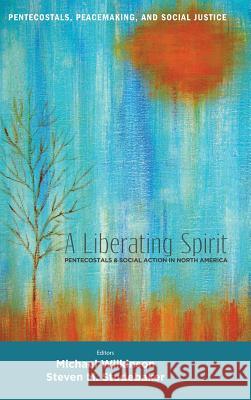A Liberating Spirit » książka
A Liberating Spirit
ISBN-13: 9781498255547 / Angielski / Twarda / 2010 / 288 str.
A Liberating Spirit
ISBN-13: 9781498255547 / Angielski / Twarda / 2010 / 288 str.
(netto: 225,16 VAT: 5%)
Najniższa cena z 30 dni: 235,11
ok. 16-18 dni roboczych.
Darmowa dostawa!
The historical ambivalence among Pentecostals about their relationship to culture and society needs evaluation. How do we understand Pentecostal engagement with society, and how are Pentecostals in North America engaging issues of race, class, gender, and ecology? What theologically motivates North American Pentecostals to respond to social issues? What categories best explain Pentecostal responses to social issues in North America? How do they compare to Pentecostal responses elsewhere? Recently, scholars of global Pentecostalism have proposed that the experience of the Spirit among Pentecostals has elicited the development of a Pentecostal ""theology of liberation,"" which has implications for understanding Pentecostal responses to social issues. These projects primarily explore the Pentecostal response to cultural issues in areas outside of North America and especially focus on Africa, Asia, and Latin America. This volume assesses whether the categories of social liberation applied to non-Western Pentecostalism characterize Pentecostalism in North America. Is there evidence of a Pentecostal ""theology of liberation"" that explains Pentecostal engagement in North America? Do social-liberation categories fit the North American Pentecostal responses to social issues or are others more suitable? These and other important questions about the relation between liberation theology and North American Pentecostalism are thoroughly explored in this important collection of essays. ""This significant collection of essays by theologians and social scientists addresses an important but understudied topic: the relationship between Pentecostalism and social action. By going beyond surface images and simple dichotomies (e.g., 'liberal' and 'conservative'), the contributors demonstrate that contradictory forces in Pentecostalism have both constrained and liberated. More importantly, they point the way toward a more socially engaged future. Anyone with an interest in social justice or Pentecostalism should read this book."" --Matthew Lee University of Akron ""This is an important, thought-provoking, and timely collection with an array of burning issues in today's world that are seldom discussed in Pentecostal academia. It is one of those paradigm-changing publications that should be read widely."" --Allan Anderson University of Birmingham, UK ""This book can be seen as a manifesto for a progressive North American Pentecostalism that connects the freedom of the Holy Spirit granted at Pentecost with social liberation and renewal. One finds a number of essays here that break through deprivation theories and assumptions concerning the inherently otherworldly nature of Pentecostalism to uncover another, much more liberating direction to the movement. This book is a must read for theologians, social scientists, religious historians, and anyone interested in the social witness of the churches."" --Frank D. Macchia Vanguard University of Southern California Michael Wilkinson is Associate Professor of Sociology and Director of the Religion in Canada Institute at Trinity Western University. His is the author of The Spirit Said Go (2006) and the editor of Canadian Pentecostalism (2009). Steven M. Studebaker is Assistant Professor of Systematic and Historical Theology at McMaster Divinity College. He is the editor of Defining Issues in Pentecostal Theology (Pickwick, 2008).
The historical ambivalence among Pentecostals about their relationship to culture and society needs evaluation. How do we understand Pentecostal engagement with society, and how are Pentecostals in North America engaging issues of race, class, gender, and ecology? What theologically motivates North American Pentecostals to respond to social issues? What categories best explain Pentecostal responses to social issues in North America? How do they compare to Pentecostal responses elsewhere? Recently, scholars of global Pentecostalism have proposed that the experience of the Spirit among Pentecostals has elicited the development of a Pentecostal ""theology of liberation,"" which has implications for understanding Pentecostal responses to social issues. These projects primarily explore the Pentecostal response to cultural issues in areas outside of North America and especially focus on Africa, Asia, and Latin America. This volume assesses whether the categories of social liberation applied to non-Western Pentecostalism characterize Pentecostalism in North America. Is there evidence of a Pentecostal ""theology of liberation"" that explains Pentecostal engagement in North America? Do social-liberation categories fit the North American Pentecostal responses to social issues or are others more suitable? These and other important questions about the relation between liberation theology and North American Pentecostalism are thoroughly explored in this important collection of essays.""This significant collection of essays by theologians and social scientists addresses an important but understudied topic: the relationship between Pentecostalism and social action. By going beyond surface images and simple dichotomies (e.g., liberal and conservative), the contributors demonstrate that contradictory forces in Pentecostalism have both constrained and liberated. More importantly, they point the way toward a more socially engaged future. Anyone with an interest in social justice or Pentecostalism should read this book."" --Matthew LeeUniversity of Akron""This is an important, thought-provoking, and timely collection with an array of burning issues in todays world that are seldom discussed in Pentecostal academia. It is one of those paradigm-changing publications that should be read widely.""--Allan AndersonUniversity of Birmingham, UK""This book can be seen as a manifesto for a progressive North American Pentecostalism that connects the freedom of the Holy Spirit granted at Pentecost with social liberation and renewal. One finds a number of essays here that break through deprivation theories and assumptions concerning the inherently otherworldly nature of Pentecostalism to uncover another, much more liberating direction to the movement. This book is a must read for theologians, social scientists, religious historians, and anyone interested in the social witness of the churches.""--Frank D. MacchiaVanguard University of Southern CaliforniaMichael Wilkinson is Associate Professor of Sociology and Director of the Religion in Canada Institute at Trinity Western University. His is the author of The Spirit Said Go (2006) and the editor of Canadian Pentecostalism (2009). Steven M. Studebaker is Assistant Professor of Systematic and Historical Theology at McMaster Divinity College. He is the editor of Defining Issues in Pentecostal Theology (Pickwick, 2008).











